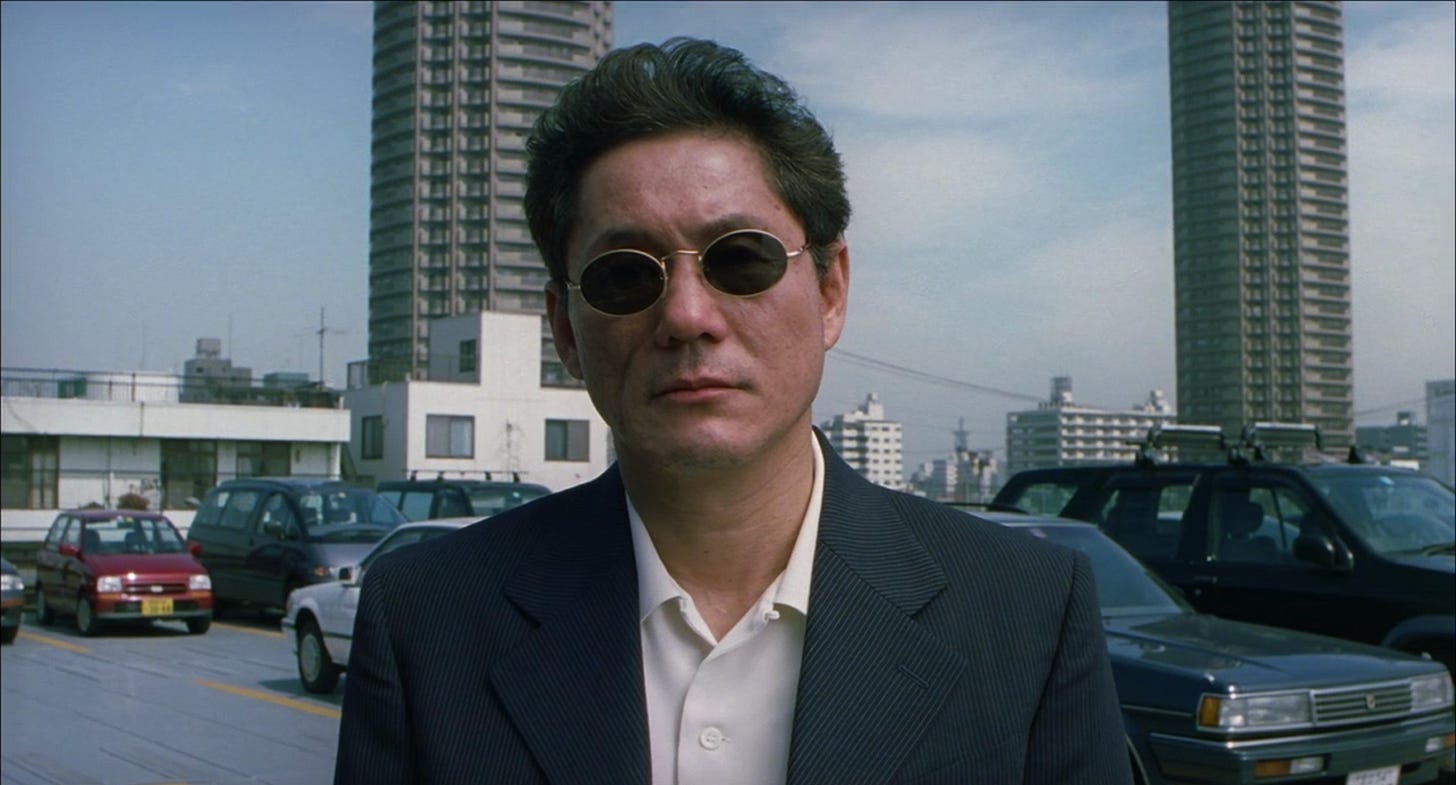Beat Happenings No. 4: Hana-bi
Beat Takeshi bounces back from a near-fatal scooter accident with his most critically-acclaimed film
Hi, I’m Bryan and this is my newsletter, Beat Happenings. Each installment focuses on Japanese comedian, TV host, actor, and filmmaker Takeshi Kitano, a.k.a. Beat Takeshi, and one of his yakuza films. This week, Kitano’s 1997 Golden Lion-winner, Hana-bi.

Beat Takeshi in Hana-bi (1997)
It wasn’t until 1997 that Japanese audiences and critics finally started taking Takeshi Kitano seriously. Although he had gained a small international following with 1993’s Sonatine, his films were viewed as little more than self-indulgent larks back home. But then his fourth yakuza movie, and seventh feature overall, Hana-bi, won the Golden Lion at the 54th Venice Film Festival. From that point on, everything changed. Audiences began to show up and critics admitted that someone they’d viewed as an idiot savant might actually know what he was doing. Less than a decade into his filmmaking career, Kitano was now considered one of the greats of Japanese cinema.
But Hana-bi (or Fireworks as it was called upon its international release) isn’t just interesting because of how it changed the perception of Kitano and his films. It also marks a dramatic shift in his work, putting down a clear marker between his early freewheeling films and everything after. It’s also the first movie he would appear in following a 1994 scooter accident that left the right side of his face partially paralyzed and which he would later call an “unconscious suicide attempt.” Kitano directed Kids Return two years after the accident but Hana-bi marked his return to the spotlight.

In the movie, Kitano plays Nishi, a detective one year removed from the death of his young daughter and fresh off the news that his wife, Miyuki (played by Kayoko Kishimoto), is dying of leukemia. Depressed and distracted, he slips up during a stakeout, leaving a fellow detective dead and his longtime partner and friend, Horibe (Ren Osugi), paralyzed from the waist down. Flash forward a year and Nishi has been kicked off the force and is in serious debt to the yakuza after turning to them to help fund his wife’s treatment. He robs a bank to pay them back, but after they demand more, he’s forced to take them out, all while driving his wife around Japan on one last road trip.
I know that sounds pretty bleak, and it is, but it’s also not that different from the type of hardboiled stories that Kitano had been telling in his previous gangster films. The movie is also littered with a number of actors from the director’s previous work, including Osugi, Susumu Terajima, and Tetsu Watanabe. And you might not even notice that half of his face doesn’t move unless you’re looking for it. Nishi is as stone-faced as any of Kitano’s other nihilistic tough guys. If anything, he might be the warmest of them all, especially since his love for Miyuki is the first interest any of them have shown in anything other than revenge.

But what differentiates Hana-bi from Violent Cop, Boiling Point, and Sonatine is the way that Kitano goes about depicting that story. There are still jokes and the occasional gory jolt of violence (at one point Nishi stabs a gangster in the eye with chopsticks), but it’s all so much more sentimental. This a serious film, one less concerned with shocking you than it is in capturing the beauty of life, whether that be fireworks in the night sky, a just-bloomed cherry blossom tree, or one the many surrealistic images painted by Kitano himself during his recovery that appear throughout the film.
More than two decades later, it’s easy to see why Hana-bi cemented Kitano’s reputation as an auteur and remains the most critically acclaimed of his films, both in Japan and abroad. It’s the work of a “mature” artist with something to say. But there’s also something about it that feels a little off to me. Hana-bi is a work of art, and an undeniably great one at that, but it lacks some of the life and uniqueness of what came before it.

That’s it for the fourth installment of Beat Happenings. Next week, I’ll be writing about Kitano’s sole English-language film, Brother. If this week’s issue has piqued your interest at all, you can stream Hana-bi on Kanopy or rent it on Amazon Video, iTunes, and YouTube Movies. In the meantime, I’d love to hear any comments or suggestions you may have about the newsletter. Just reply to this email and let me know what you think.


